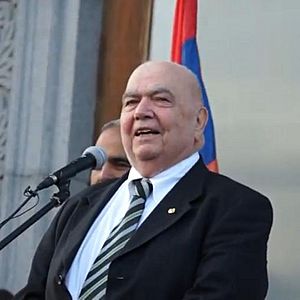Richard G. Hovannisian facts for kids
Quick facts for kids
Richard G. Hovannisian
|
|
|---|---|

Hovannisian during the anti-government protests in Yerevan's Freedom Square in March 2013
|
|
| Born |
Richard Gable Hovannisian
November 9, 1932 Tulare, California, U.S.
|
| Died | July 10, 2023 (aged 90) Los Angeles, California, U.S.
|
| Nationality | American |
| Alma mater | UC Berkeley UCLA |
| Known for | Republic of Armenia (4 vols.) |
| Spouse(s) | Vartiter Hovannisian (née Kotcholosian) |
| Scientific career | |
| Fields | Armenian, Russian, and Near Eastern history |
| Institutions | UCLA |
| Doctoral advisor | Raymond H. Fisher |
| Doctoral students | George Bournoutian, Levon Marashlian |
Richard Gable Hovannisian (born November 9, 1932 – died July 10, 2023) was an American historian and a professor at the University of California, Los Angeles (UCLA). He is best known for writing a four-book series about the history of the First Republic of Armenia.
Contents
About Richard Hovannisian
Early Life and Family
Richard Hovannisian was born on November 9, 1932, in Tulare, California. His parents were survivors of the Armenian genocide. His father, Gaspar Gavroian, was born in a village called Bazmashen in the Ottoman Empire. He escaped the genocide in 1915 and moved to the United States by 1920. He changed his last name to Hovannisian, using his own father's name, Hovhannes.
In 1926, Gaspar married Siroon (Sarah) Nalbandian. She was also a child of genocide survivors. Richard was their third son, named after the famous actor Clark Gable.
Education and Teaching Career
Hovannisian studied history at the University of California, Berkeley, earning his first degree in 1954. He then went to University of California, Los Angeles (UCLA) for his master's degree (1958) and his Ph.D. (1966).
He started teaching at UCLA in 1962. From 1966 to 1969, he was also a professor at Mount St. Mary's College in Los Angeles.
Important Historical Work
Hovannisian's main focus was the history of the First Republic of Armenia (1918–1920). His Ph.D. paper, which he planned to be a full history, was published in 1967 as Armenia on the Road to Independence. This book was like an introduction to the four-book series he later published between 1971 and 1996. These books covered the history of the First Republic of Armenia and were highly praised by other historians.
In 1986, Hovannisian became the first person to hold the Armenian Educational Foundation Endowed Chair in Modern Armenian History at UCLA. This was a special teaching position created to support the study of Armenian history. He received many awards for his studies and his work to help Armenian history be understood. He was also named one of UCLA's "Most Inspiring Teachers" in 2010–2011.
Collecting Oral Histories
Starting in 2014, Hovannisian also worked as a professor at the University of Southern California (USC). He helped with a project to add interviews about the Armenian Genocide to the Shoah Foundation's collection.
In 2018, he gave his own collection of interviews to the USC Shoah Foundation. This collection, called the Richard G. Hovannisian Armenian Genocide Oral History Collection, has over 1,000 interviews. It is the largest collection of stories about the Armenian Genocide. He started recording these interviews in 1972. His students helped him interview survivors of the genocide in California and other places. Later, as survivors passed away, the interviews focused on their children.
In 2020, he received the Armenian Genocide Education Legacy award for his important work in teaching about the genocide.
Personal Life
Richard Hovannisian married Vartiter Kotcholosian in 1957. They had four children: Raffi, Armen, Ani, and Garo. Their son, Raffi, later became the first Foreign Minister of Armenia.
Richard Hovannisian passed away in Los Angeles on July 10, 2023, at the age of 90.
Political Views
Richard Hovannisian believed that Armenia should be a strong and fair country. In 2006, he spoke about his concerns that the Armenian government was becoming too strict. He also took part in protests in 2013 after the presidential election in Armenia. His son, Raffi, was a candidate in that election.
Selected Books
Here are some of the important books Richard Hovannisian wrote or edited:
- The Armenian Holocaust, 1980
- The Armenian People from Ancient to Modern Times, 2 volumes, 1997 (editor)
- Remembrance and Denial: The Case of the Armenian Genocide, 1998 (editor)
UCLA Conference Series Books
As the head of Modern Armenian History at UCLA, Hovannisian organized a series of conferences about historic Armenian towns and regions. He edited the books that came from these conferences. Some of these books include:
- Armenian Van/Vaspurakan (2000)
- Armenian Baghesh/Bitlis and Taron/Mush (2001)
- Armenian Tsopk/Kharpert (2002)
- Armenian Karin/Erzerum (2003)
- Armenian Sebastia/Sivas and Lesser Armenia (2004)
- Armenian Tigranakert/Diarbekir and Edessa/Urfa (2006)
- Armenian Cilicia (2008)
- Armenian Pontus: The Trebizond-Black Sea Communities (2009)
- Armenian Constantinople (2010)
- Armenian Kars and Ani (2011)
- Armenian Smyrna/Izmir (2012)
- Armenian Kesaria/Kayseri and Cappadocia (2013)
- Armenian Communities of Asia Minor (2014)
See also
 In Spanish: Richard G. Hovannisian para niños
In Spanish: Richard G. Hovannisian para niños
 | William L. Dawson |
 | W. E. B. Du Bois |
 | Harry Belafonte |

